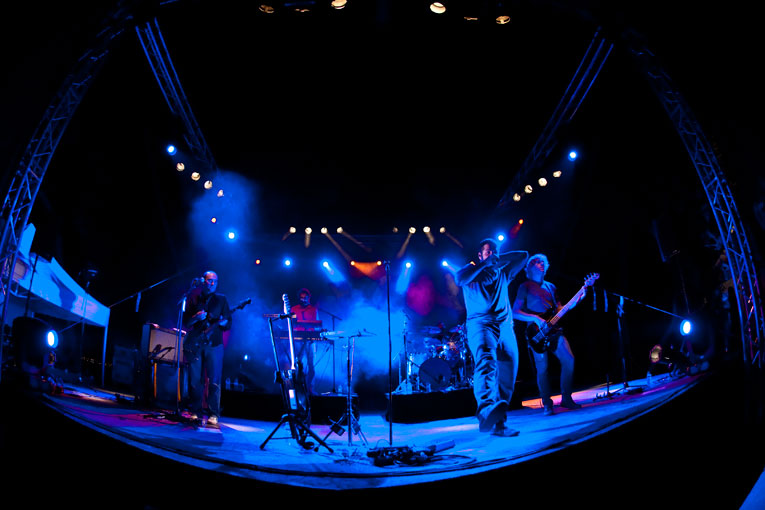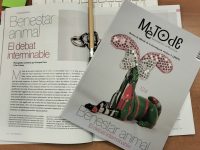
 Foto: Josep Tomàs (Flickr) Antònia Font in a live concert at Altaveu Festival in Sant Boi de Llobregat (Barcelona, 2011), when their spatial phase was already over. |
||
|
Giving up your Martian status must be difficult. Antònia Font, whose members are now claiming an Earth passport, are a good evidence of this. It has been a real challenge for the press not to talk about their music without mentioning outer space, aliens and robots. Many journalists have insisted once and again on their extraterrestrial origins. Their discography— in which they show an open fascination with outer space— is in part to blame. It is easy finding examples of this reality, especially in their first albums. From songs in which spatial motifs are only an excuse to talk about more mundane things like Tornar a sa Terra (Coming back to Earth), Ses estrelles des cel (The stars in the sky), Asteroide núm. 15000 (Asteroid nº 15000), or Amazones a sa lluna; to songs that mix scientific concepts with a poetic language, so typical of the band’s early works. Among these we can include the joyful L’univers és una festa (The universe is an ongoing party— «You can hardly notice its rotation/ nobody has seen its orbit/ because it happens after lunch/ when we are taking our nap»); or the third part of the Cibernauta Joan, (Joan, the cybernaut) trilogy, where its main character becomes an accidental astronaut, who is taking Moon particles to carry out a mysterious experiment. Both of these songs can be found in their first album Antònia Font (DiscMedi / Blau, 1999), ), a debut that allowed us to make out their ascent to outer space. A cosmic delirium that would reach its climax in their fourth album— Taxi (DiscMedi / Blau, 2004)— which meant the peak of Antònia Font’s career and, if you allow my enthusiasm, one of the best achievements in Catalan songwriting. First conceived as a conceptual work, Taxi contains seventeen songs structured in four different parts, which have their own titles. Its first part— Dos souvenirs de la Terra(Two souvenirs from Earth)— and its third part— Viatges i postals de la Terra (Trips and postcards form the Earth)— have some of the most effective songs in the album, which represent melancholic memories of someone who has been away from our planet for a long time. However, the most important aspect of the album— from astronomy’s point of view— is in this fictional character’s space travel, which is talked about in the other two parts of the album. On the second part— Recital del robot i l’astronauta (The robot and the astronaut’s recital)— they let themselves be carried away by their obsession for spatial exploration, combined with another recurring obsession in their discography— robotics. The track entitled Armando Rampas, which could be the main character’s name, tells the story of an astronaut who makes his first space travel («Blue and white planet, farewell from high above/ tomorrow I will breath gasified ether»). This adventure is taken up at La vida de l’astronauta (An astronaut’s life), which talks about the traveller’s experiences, abandoned by technology in the middle of a colourful universe filled with strange shapes. The adventure goes on with Extraterrestres (Extraterrestrials), a song that welcomes people from other planets that would delight Carl Sagan himself, with a more efficient discourse than Arecibo’s message, the Pioneer mission plaques and the Voyager golden record put together— «Hello, how are you?/ we are your friends from the Earth/ a dusty and shitty planet/ in an inhospitable solar system». The act closes with Vehicle lunar(Lunar vehicle), a very beautiful instrumental piece that lasts for only thirty six seconds. |
«Antònia Font’s debut allowed us to make out their ascent to outer space. A cosmic delirium that would reach its climax in their fourth album— Taxi »
«Its members let themselves be carried away by their obsession for spatial exploration, combined with another recurring obsession in their discography— robotics» |
|
 Foto: Antònia Font Even though Taxi (DiscMedi / Blau, 2004) is their most cosmic album, outer space is a recurring motif in Antònia Font’s discography. In the picture, we can see the members of the band dressed up as astronauts in Alegria‘s videoclip , song included in Alegria (Virgin-Drac, 2002). |
|
|
|
Astronauta rimador (Rhymester astronaut) is a crazy song that opens the last part of the disc— Gran final l’hotel Galaxi)— whose lyrics talk about the misfortunes experienced in a singular spaceship with a great sense of humour, as told by a veteran astronaut, tired of bureaucratic and technological deficiencies. At this point the album adopts a more ominous tone, of which the instrumental piece Cosmos immutable (Immutable Cosmos) is a good example. Especially bitter is Càpsula d’emergència (Emergency capsule), a suffocating theme in which the space explorer expresses his loneliness and his determination to carry out his mission («H2O particles are boiling on the flaking ceiling/ among solar systems, in the lost space/ The astronaut is walking with the certainty of knowing/ that amps are the voltage divided by resistance»). The album closes with Stevie Wonder’s famous song I Just Called to Say I Love You, which apparently represent the astronaut’s last words. This is how Antònia Font finishes their space adventure. Their obsession with astronautics would not remain any longer in their subsequent albums— maybe because they feared being typecast. SONGS THAT PASS THROUGH EVERYTHING When Antònia Font launched their sixth studio album Lamparetes (Little lamps) (Robot Innocent, 2011), they definitely left aside the space motif and focused on more mundane topics. This album, with and ode-to-pioneers aura, meant also their abandonment of their characteristic poetic language—this time they used a more narrative style. This change made them lose their singularity as a band. Lamparetes is an ode to progress, to those who dare to dare when some things seem unthinkable. But its references to science do not go beyond listing inventions in their song Coses modernes (Modern things). In Vostè és aquí (You are here) (Robot Innocent, 2012) they unexpectedly turn again to science. Among the forty short songs that make up the album, there is Neutrins(Neutrinos), written by Joan Miquel Oliver —who writes most of the band’s songs—, a regular reader of popular science journals. In an interview published in Enderrrock‘s 204th issue, the songwriter explained that the song was written because he was fascinated by particles’ ability to pass through everything— a feature shared with Antònia Font’s music. In spite of their efforts, their songs evoke far away worlds— no matter if they are talking about outer space, deep oceans or their home. Extraterrestrial or not, their particular style can move us more subtly than evidently, but equally effectively. We grant them, if they insist, a human status. But I hope they don’t try to adapt their universe to our narrow minds. Sometimes –astronomers know this very well— there is beauty in not understanding everything. To listen: Felip Pineda. Journalist. |
«Lamparetes meant the band’s abandonment of their characteristic poetic language»
«Among the forty short songs that make up Vostè és aquí, there is Neutrins, written by Joan Miquel Oliver —who writes most of the band’s songs—, a regular reader of popular science journals » |
|





